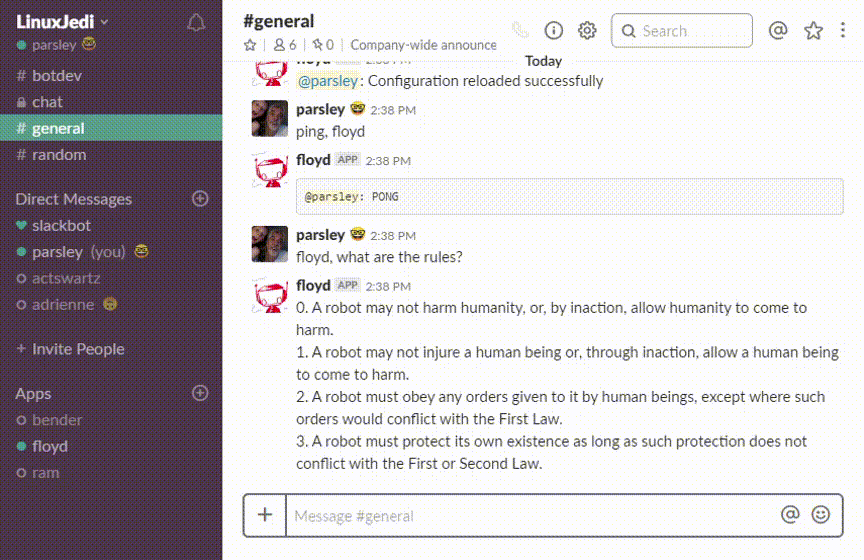+
Gophers + Robot by Renee French (cropped) licensed under Creative Commons License 3.0
Enterprise Slack(*) ChatOps bot for Linux and Windows, supporting plugins in Python, Ruby, Bash and PowerShell
Download the current release for your platform from: https://github.com/lnxjedi/gopherbot/releases/latest
To try out Gopherbot for yourself and write your first plugin, see the Quick Start Guide
(*) with a modular interface for writing other protocol connectors in Go
A few of Gopherbot's features:
- Built-in support for elevated commands requiring MFA (ala 'sudo')
- A prompting API for interactive plugins
- Comprehensive set of administrative commands
- Simple single-file script plugins
#!/usr/bin/ruby
require 'net/http'
require 'json'
# To install:
# 1) Copy this file to plugins/weather.rb
# 2) Enable in gopherbot.yaml like so:
#ExternalScripts:
#- Name: weather
# Path: plugins/weather.rb
# 3) Put your configuration in conf/plugins/weather.yaml:
#Config:
# APIKey: <your openweathermap key>
# TemperatureUnits: imperial # or 'metric'
# DefaultCountry: 'us' # or other ISO 3166 country code
# load the Gopherbot ruby library and instantiate the bot
require ENV["GOPHER_INSTALLDIR"] + '/lib/gopherbot_v1'
bot = Robot.new()
defaultConfig = <<'DEFCONFIG'
Help:
- Keywords: [ "weather" ]
Helptext: [ "(bot), weather in <city(,country) or zip code> - fetch the weather from OpenWeatherMap" ]
CommandMatchers:
- Command: weather
Regex: '(?i:weather (?:in|for) (.+))'
DEFCONFIG
command = ARGV.shift()
case command
when "configure"
puts defaultConfig
exit
when "weather"
c = bot.GetTaskConfig()
location = ARGV.shift()
location += ",#{c["DefaultCountry"]}" unless location.include?(',')
uri = URI("http://api.openweathermap.org/data/2.5/weather?q=#{location}&units=#{c["TemperatureUnits"]}&APPID=#{c["APIKey"]}")
d = JSON::parse(Net::HTTP.get(uri))
if d["message"]
bot.Say("Sorry: \"#{d["message"]}\", maybe try the zip code?")
else
w = d["weather"][0]
t = d["main"]
bot.Say("The weather in #{d["name"]} is currently \"#{w["description"]}\" and #{t["temp"]} degrees, with a forecast low of #{t["temp_min"]} and high of #{t["temp_max"]}")
end
endThe goal is for Gopherbot to support multiple scripting languages with built-in security features, to make secure ChatOps functions easy to write for most Systems and DevOps engineers.
Examples of work Gopherbot is already doing:
- Building, backing up, restoring, stopping and starting instances in the AWS cloud
- Disabling / reenabling user web directories when requested by security engineers
- Adding users and updating passwords on servers using Ansible
Gopherbot 1.x is stable and running in production in several environments.
Development has started for Gopherbot 2.x, which adds features for scheduled jobs and pipelines. See the development notes.
Check out Github's documentation on forking and creating pull requests. Feel free to shoot me an email for an invite to the LinuxJedi Slack team.
NOTE: This is the documentation for Gopherbot v1.1. For older versions, see the documentation included in the distribution archive.
Also see the full Documentation Index


